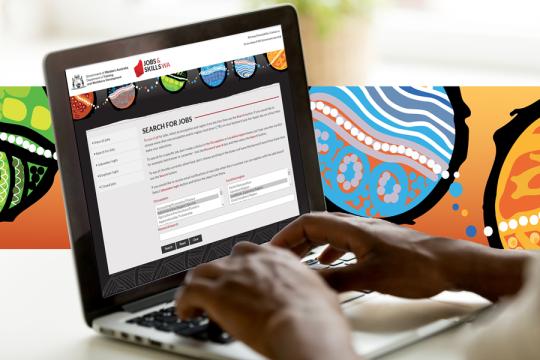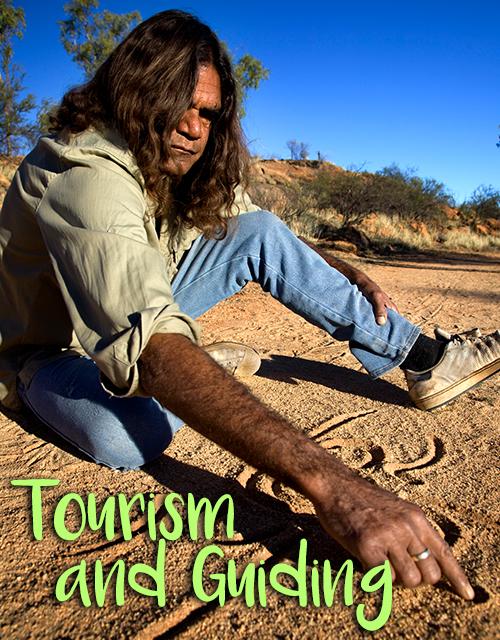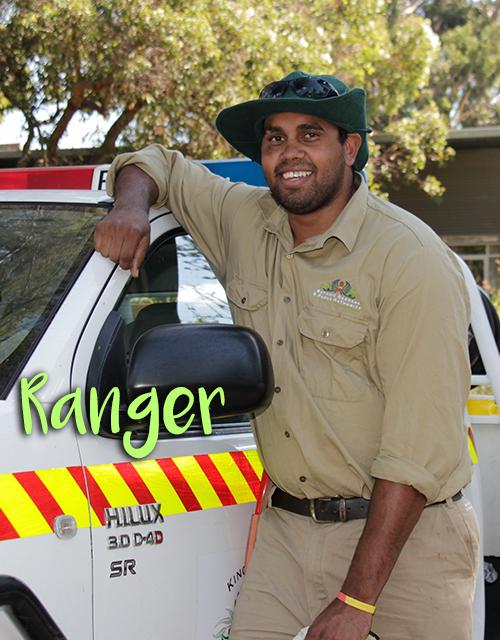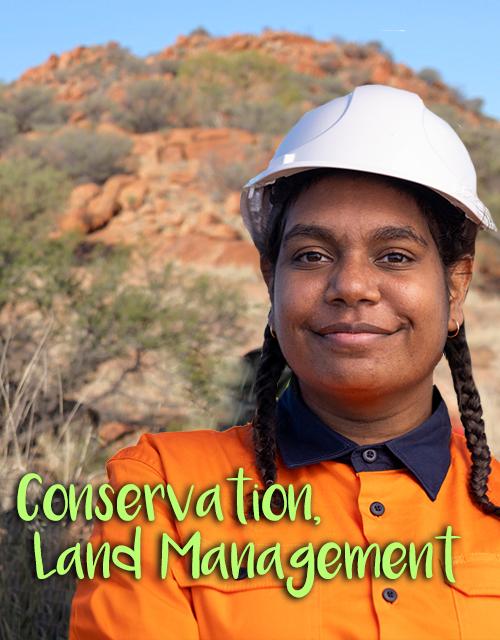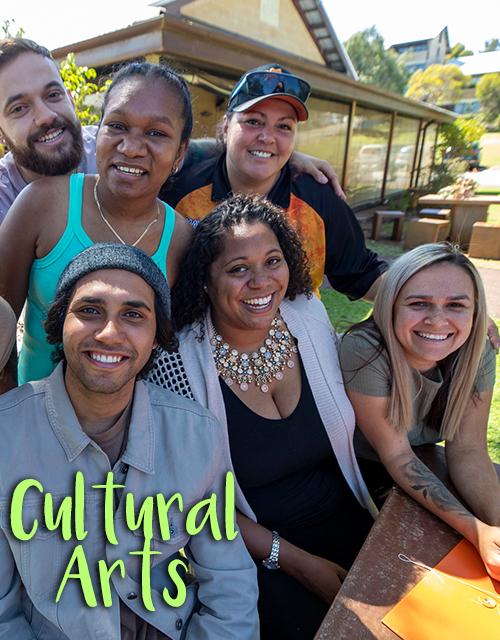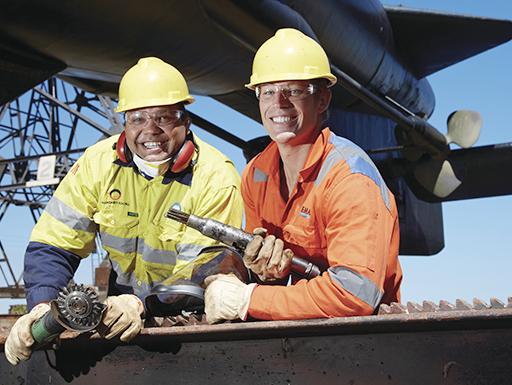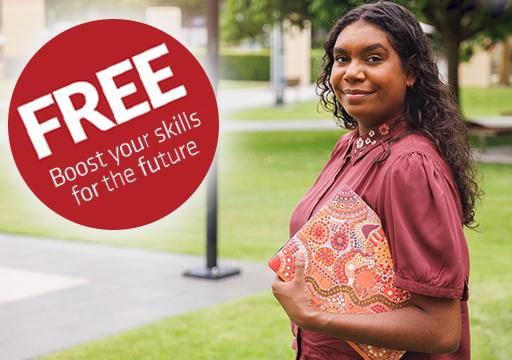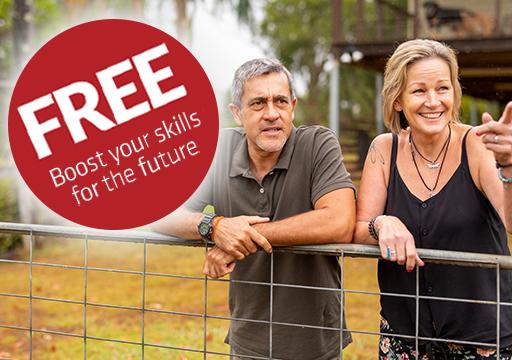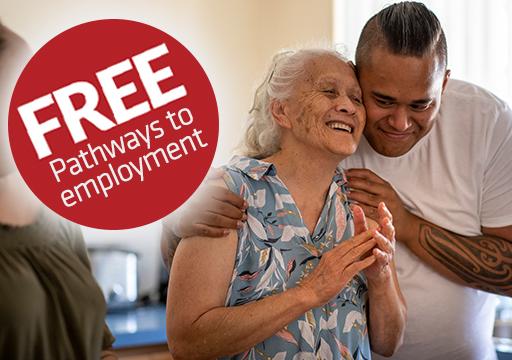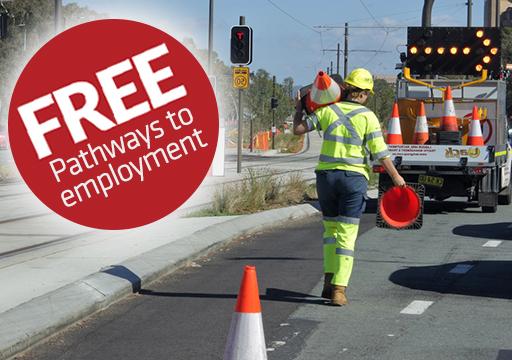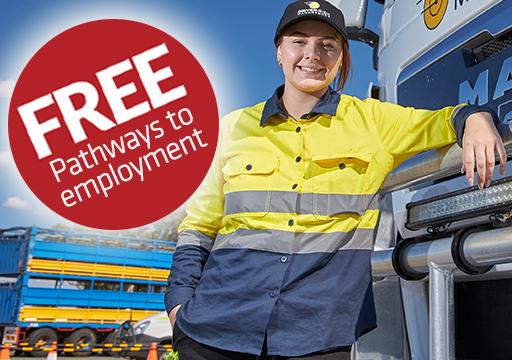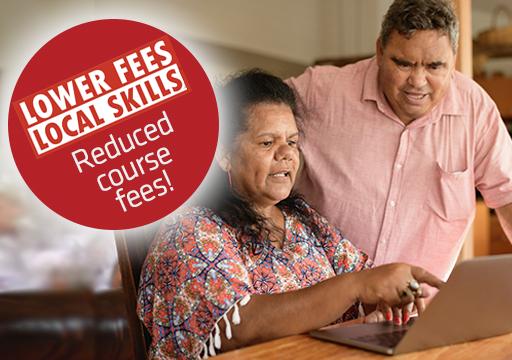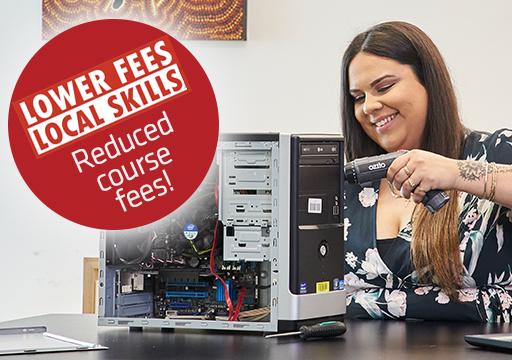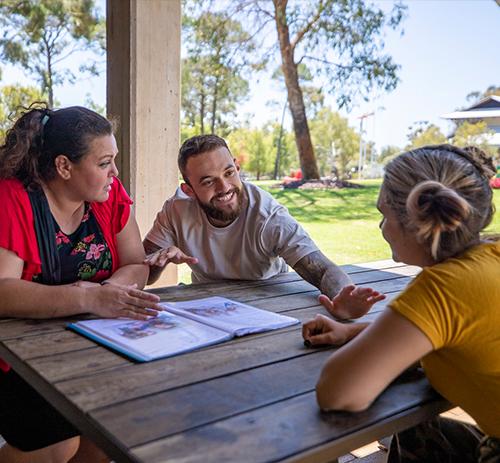Whether you're new to jobseeking or looking for a career change, or need to skill up to kickstart your future, we can help! Just bring your life experience, and we'll help you turn it into a career.
Free and friendly advice to help you out
Jobs and Skills Centres are located across Perth and regional WA. They offer a range of specialist support services and programs for Aboriginal and Torres Strait Islanders — all free!
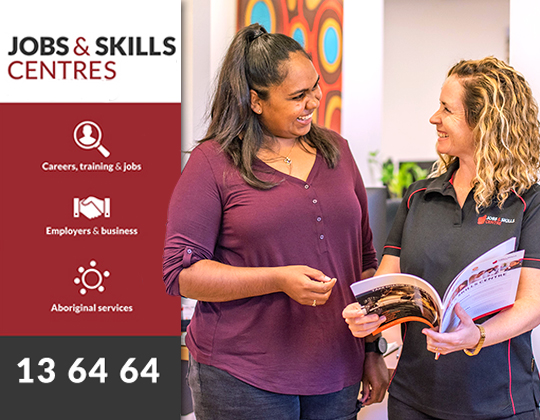
You can get advice and guidance about training, career and employment options, to help choose your path. JSCs can also help connect you with employment opportunities — including apprenticeships and traineeships.
If you're not sure how to take the next step...
If you'd like to talk to someone, or find out more about the services available, contact your local Jobs and Skills Centre.
There's no limit to what you can achieve!
 Rekeisha Voss “I’m extremely proud for not giving up and really pushing myself to complete my traineeship. It's one of the best things I’ve ever done. It’s given me more opportunity to be in control of my own destiny. One of the most valuable things about a traineeship is the flexibility, which worked great for me with two young children." |
 Kevin Wilson "Using what I’ve learnt at TAFE, I have built a design studio of 100% Aboriginal people. |
 Shania Ah Chee "Becoming a chef is something I have always known I wanted to do, so when the opportunity presented itself to me I knew nothing was getting in the way of making my dream come true. Juggling work life and being a mum has been a huge challenge but making my daughter proud motivates me to continue to be the best mum and chef I can be." |
Aboriginal services jobs board
We have a free online jobs board, where we post opportunities for Aboriginal jobseekers. It's completely free to use, and could be the place to find your dream job! Once you're registered on the jobs board, you can set up a profile to receive emails about job opportunities that match what you are looking for — then apply online, quick and easy!
The jobs board also gives you a free online space where you can save all your jobseeking documents, such as your CV/resumé and cover letters.
 |
Our Deadly Jobs page on Facebook has employment opportunities plus tips and useful information for Aboriginal jobseekers. |

Training for a career close to culture
There's hundreds of different courses to choose from, but if you're after a career that can keep you close to country and culture, and where you can make a positive contribution to your community — getting skilled up with the right training is your first step.
How would you like to work as a guide in the tourism industry, taking people on tours through some of WA's most beautiful destinations and sharing traditional history and culture?
How about working on country as a ranger, or in conservation and eco management — helping to look after and protect WA's precious lands and waterways for future generations?
Maybe you love art, and would love to learn more about traditional arts and crafts practices? Or you could start a career in Aboriginal and/or Torres Strait Islander primary healthcare.
These are just a few of your choices — you can follow the links below and search our course list to check out these great options.
- Certificate III in Guiding
- Certificate I in Tourism: Australian Indigenous Culture
- Certificate III in Aboriginal Sites Work
- Certificate II or III in Conservation and Ecosystem Management
- Certificate III in Indigenous Land Management
- Certificate II or III in Aboriginal and Torres Strait Islander Cultural Arts
- Certificate III or IV in Aboriginal and Torres Strait Islander Primary Healthcare
Your skills and experience have value!
You may have more skills than you know — even if you don't have years of work experience behind you, or any formal qualifications, you still have a lot to offer. Skills can come from all aspects of your life, work, learning and leisure activities, and they are all valued by employers. Skills that are particularly valuable include communication and interpersonal skills; being able to work in a team; problem solving and creative thinking; and being organised and reliable.
Here's just a few examples of how your life experience translates directly to employability skills.
| What you've been doing | What skills and knowledge you could have |
|---|---|
| Managing a household | Budgeting and financial management; planning and organising; time management; problem solving and decision making; creative thinking; negotiation skills |
| Community involvement | Teamwork; listening skills; verbal communication skills; business documents and practices; negotiation and conflict resolution; decision making; problem solving; time management; planning and organising; leadership |
| Playing sport | Teamwork; leadership; communication skills; listening; negotiation and conflict resolution; physical flexibility; decision making; problem solving; time management; planning and organising |
| Cooking, household duties | Food preparation and safety; nutrition; kitchen and cooking skills; planning and organising; time management |
| Being a parent | Communication skills; listening; negotiation and conflict resolution; problem solving; creative thinking; first aid; time management; planning and organising; leadership; teamwork |
| Volunteering | Depending on the type of volunteering you have done, this could be a long list! Think about teamwork; communication skills; time management; decision making; negotiation and problem solving; business documents; business practices; customer service and leadership |
There are just a few examples, but never think that you have been "not doing much" because you haven't been in paid employment... think about all aspects of what you do, and what you know, and how they relate to being in the workforce.
Useful resources
To help get you take stock of your life experiences and how they relate to employability skills, the following resources may be useful. You can find them all here
| Template: Recognising skills and abilities | Discover the skills and abilities that you already have |
| Checklist: Personal and transferable skills | This checklist will help you identify skills that are transferrable to the workplace |
| Fact sheet: Employability skills | Discover what skills you already have that are important to most employers |
| Fact sheet: Changing your career | Use this to help guide you towards a career that suits you |
| Template: Your action plan | Get started on your own career action plan and start setting goals for your future |
Further information
It's worth taking some time to thinking about what you have to offer, where your value is, and what kind of career path would suit you best. To help with this, you can take a look at the following information on our website to find out more and hear other people's stories.
| Choose a path | Knowing yourself, what you want and what's out there is the first step |
| Skill up | Maybe you need to do some training, or get some hands-on experience, to improve your chances of getting that job you want. |
| Get a job | Take a look at our helpful hints and find out how to get out there and get that job. |
| Aboriginal jobseekers | Some useful information to help with your career planning and jobseeking. |
| Events, workshops and forums | Find out about our free workshops that can help with your job search. |
What occupations are you interested in?
We have hundreds of occupation profiles you can look through and find out what kind of work you'd be doing, the responsibilities you would have, what kind of working conditions you would be in, and any training or qualifications you may need to get started and then build your career.
Use the keyword search below, or you can go to our main Occupational Profiles list and browse through the list from A—Z here
Please note that the impact of COVID-19 is an unprecedented situation that will impact our ability to report accurate course information and employment trends at this time. Some employment trends and course availability information provided in occupation profiles may not be current.

What the workforce offers you
Being part of Western Australia's workforce offers you many benefits, but there's also some great reasons why we would love to see you get into work! Right now there's a whole load of fantastic opportunities out there for you, in a range of exciting jobs. There's really no barriers when it comes to your career options.
A few reasons why employers need you...
- Cultural diversity — Just like we all benefit from knowing people of different cultures, so do businesses! Your life experiences and cultural knowledge brings diversity in thinking, and different ways of doing things, and that's exactly what smart businesses want
- Cultural learning — Sharing your culture and traditions with workmates helps others to learn and understand
- Customer connections — You have connections and networks that non-Aboriginal people may not, and you can help a business engage with different markets and understand the needs of Aboriginal customers
- Teamwork — You understand the importance of community, and working as part of a team, and that is a great benefit to the workplace
Financial independence and less money worries
Being employed means more financial independence for yourself and your family, and less money-related stress overall. Whether you want to work part time to help with bills or spending money, or get into a full career with a nice salary, it's a great feeling to have that financial support!
Support and mentoring
Many workplaces offer fantastic support for new employees, especially if you're not very experienced in the world of work. You might even have a workplace mentor — like a coach — who will help you get settled in your new job and show you how things are done. Many employers also offer specialised mentoring for Aboriginal people, to ensure that you are being given the support needed to settle in successfully to your new workplace.
Flexibility friendly
More workplaces than ever are now embracing the idea of flexible work environments and when, where, and how your work is accomplished. This is really useful if you are trying to combine working with study; or if you have other responsibilities such as family; community or sports that you need to fit in around your work schedule.
Diverse and inclusive workplaces
Many businesses celebrate diversity and inclusivity; and welcome people of all ages, gender preferences, cultures and backgrounds. Diversity enriches the workplace, and brings different experiences and perspectives to the business.
Learning new things
Getting into work opens up a whole world of learning — new skills, new experiences, new people — it can give you a whole new energy!
Gaining new skills and developing your knowledge through training is another great way to progress towards a career. If you're skilling up, most TAFEs and training providers offer delivery options to suit all kinds of schedules. These include on campus, full or part time, flexible delivery outside of business hours, online learning, or via virtual classrooms so that you can combine study with your work schedule.
Social benefits
We sometimes don't really think that work equals friends, but most people have at least one friend at work. Some of us even have a workplace best friend! Getting into the workforce will introduce you to new people, who can enrich your life. You'll also have opportunities to build professional networks, which can be very important for future career moves.
Sense of accomplishment
Being part of the workforce can give you a fantastic feeling of pride and accomplishment, and can make you a role model that inspires others in your mob. Even if you just start with small steps — maybe a low stress part time job — it feels good to know you're moving forward in a positive direction.
Personal wellbeing
Unemployment might be ok for a little while, but when it stretches out over longer periods of time it can start to mess up your mental health and personal wellbeing. It can also affect your self esteem, and you start to lose confidence in yourself.
It takes just one step to change your future — that first step, and you're on your way. Working keeps your brain active — you're learning new skills, meeting new people, and your brain and body is active. This makes you feel good in yourself, and about yourself!
Beyond Blue has eight tips for looking after your mental health through unemployment and offers a range of support services through their website, if you would like to explore this further — and remember, always ask for help if you need it.

Options to skill up
If you need to skill up and build some confidence before you're ready to go for that new job, or to make a career move, we've got some great options for you!
We have free short course skill sets, targeted to specific job ready skills that can give you a head start on getting a job; job ready programs that include work experience so you gain real hands on experience; pre-traineeships and pre-apprenticeships to help you get an apprenticeship or traineeship; and full qualifications with course fees reduced by up to 72 per cent. There's even some great options for Aboriginal students in Year 11 and 12 to get a head start on training for a future career. Plus we have support available to help you get into training, and specialised support programs if you would like to build some job ready skills. You can also get free advice and information about training at your local Jobs and Skills Centre.
Free short courses: Skills Ready skill sets
Our range of Skills Ready skill sets have been developed in consultation with businesses and employers to deliver fast track training that will get you skills ready for jobs. They are available in areas including including hospitality, aged care, healthcare, retail, business, cyber security, green jobs, pool lifeguard, small business, agriculture, heavy haulage driving, mental health, construction.. and many more!
Whether it's a refresher or an introduction to a new field of work, these skill sets will bridge any gaps in your knowledge without too much of a time commitment — most run for only a few weeks and are available part time, and some can be done online.
All the skill sets contain units from nationally accredited and recognised vocational education and training (VET) qualifications.
Some of these skill sets are 100% free for everyone, and others are 100% free for eligible persons including 15—24 year olds, jobseekers, persons receiving Youth Allowance or ABSTUDY; and people holding a pensioner concession or Health Care Card.
Job Ready Programs — Pathways to employment
Are you looking for work, but need some skills and experience? How would you like to get on a pathway to employment, through a program that combines training and on the job industry experience that provides opportunities to connect with a job, an apprenticeship, traineeship, or further training and employment? Right now there's many new programs and projects all across Western Australia, creating a pipeline of work and fantastic job opportunities in a range of industries.
There's never been a better time to get on a pathway to employment, and we want to help you take advantage of all these opportunities! Our Job Ready Programs are short courses that combine training at a TAFE college or private training provider, with a period of industry placement where you'll gain real hands on experience in the workplace.
The programs are available in a range of industry areas including aged care and disability support and building and construction, and they're 100% free for eligible students including 15—24 year olds, jobseekers, persons receiving Youth Allowance or ABSTUDY; and people holding a pensioner concession or Health Care Card.
Qualifications with course fees reduced by half or more
For some jobs or career goals, you'll need to have a full qualification. The good news is we have reduced the course fees* by up to 72 per cent on 210 qualifications for areas where skilled workers are in demand, to help you take advantage of these job opportunities!
Course fees are capped at only $400 annually for eligible students!
That means that concession-eligible students won't pay any more than $400 in course fees*, no matter what they actually add up to — this can save you hundreds of dollars! The $400 annual fees cap is available for people aged 15—24; jobseekers; people receiving Youth Allowance, AUSTUDY or ABSTUDY, and persons holding a pensioner concession or Health Care Card. The annual course fees cap is $1,200 for non-concession eligible students.
These reduced-fee qualifications are part of our Lower fees, local skills program, and they're available from selected TAFE colleges and private training providers across Western Australia.
With 210 qualifications to choose from, there's something for everyone — from automotive to aged care, tourism and hospitality to information technology, childcare to agriculture, building and construction to electrical engineering, dental nursing to web design and development... too many to list here!
These are all nationally recognised and accredited qualifications. And remember, eligible students won't pay more than $400 in course fees for any of them!
We have details about these reduced-fee Lower fees, local skills qualifications and how the annual fees cap works, plus a full list of what's available, on our Skills Ready page.
Show me the reduced-fee courses
*The fee reduction and annual fees cap applies to course fees only — other fees may apply. Please visit the Skills Ready page for full details.
Support to get you into training
If you need a bit of support to be able to get into training; or need to build your reading and writing, technology and maths skills, we can help!
We have a range of learning support options available through our Participation—Equity programs, including:
- services such as mentoring and counselling;
- assistance with things like meals, transport and child care;
- financial assistance to help with course fees; and
- help with resumé writing and job placement.
We also offer foundation skills and equity courses, which focus on language, literacy and numeracy, and employability skills such as teamwork, problem solving, self-management, digital literacy and using technology – all key skills requirements for success in both training and the workplace.
Find out more about our learning support programs
Apprenticeships and traineeships
Doing an apprenticeship or a traineeship enables you to earn while you learn — you work and get paid, just like a regular employee, but you also complete a vocational education and training (VET) qualification. This is usually done by a mix of on the job learning, and formal training with a TAFE college or training provider. And they're not just for "young" people, there's no upper age limit.
Apprenticeships focus on licensed trades areas such as bricklaying, engineering, plumbing, hairdressing, mechanical, electrical etc.
Traineeships are generally for non-trade areas such as information technology, business, aged care and retail.
There's even an Aboriginal school-based apprenticeship/traineeship program available in some WA schools for Aboriginal students in Years 11 and 12 — what a great way to get a head start on a career!
Take a look at this short video with Leslie, who wanted to challenge himself and be a role model for his community.
He's now loving his new career, and planning for his future.
You can find out more about apprenticeships and traineeships here

Free advice, information and support
If you're not sure how to take the next step – reach out
Located across Perth and regional WA, Jobs and Skills Centres provide free support and guidance for everything training, jobs and careers.
The best part is, all the services they offer are free! Call your local Jobs and Skills Centre to find out how they can help you, or use the link below to find your nearest centre and stop by for a yarn.



